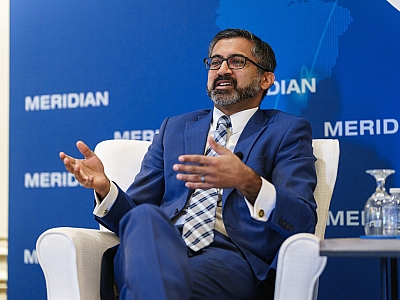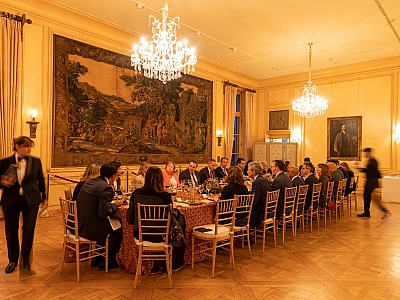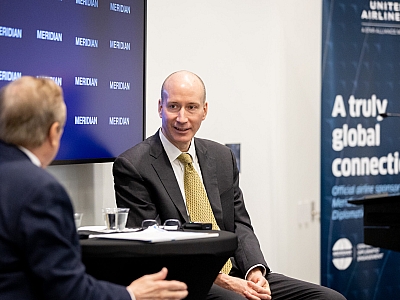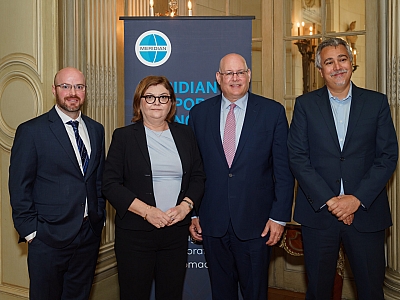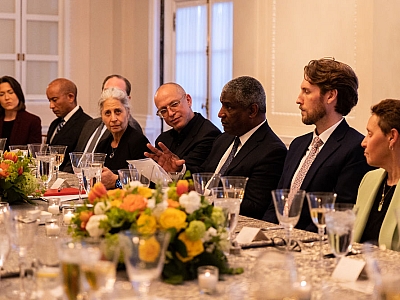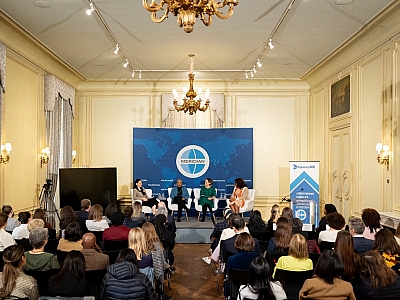Explainer: Understanding Space Diplomacy
Solutions to plenty of our shared global challenges can transcend Earth—and be found in outer space. The fact that satellites have helped detect illegal fishing in the Pacific Islands is only one example of space improving our planet. The human desire to explore space is exponentially growing as the value of the space economy is projected to surpass $1 trillion by 2040. The opportunities for human gain are as boundless as space. Like the “Wild West,” the lack of worldwide laws causes a sense of uncertainty in different pursuits of space exploration and could lead to escalation of conflict. However, this can be avoided through strong international collaboration. In other words, the future of human safety and success in space will depend on space diplomacy.
Defining Space Diplomacy:
Space diplomacy is about safeguarding outer space through international collaboration and concrete frameworks—all for the utmost benefit of humankind. It supports the promise and innovation that the booming space economy brings. But it also recognizes that these opportunities will only unlock its maximum potential in safe, sustainable and equitable conditions. The lack of such conditions could open the door for some governments to weaponize space, leading to irreversible conflict. Thus, space diplomacy brings together important players like the public sector, the private sector, experts and civil society to steer the future of space in an invigorating yet responsible direction.
An ideal, tangible outcome of space diplomacy would be a new United Nations (UN) law that is universally accepted and addresses global outer-space governance. In absence of this, the U.S. has established the Artemis Accords to work with as many nations as possible to come up with shared norms. As of April 2024, 38 countries have signed on to this series of bilateral agreements.
Objectives of Space Diplomacy:
- Establishing a global security framework: As more governments and companies look to capitalize off space, the possibility of conflict grows. Space diplomacy aims to create overarching rules and codes of conduct so disagreements can be solved peacefully–under the premise that space should be accessible and fair to all nations. This also consists of international agreements to set rules around the creation of arms and weapons in space. International cooperation is vital to prevent the likelihood of disputes and more extreme scenarios, such as a space arms race.
- Addressing shared challenges: Space technologies are projected to seep in further into our daily lives. Space diplomacy looks to harness this rapid growing innovation and economic development to find new and improved solutions to our shared global challenges. Consider the ability to detect an earthquake through satellites, or the ability to source more water from space mining.
- Promoting global engagement: Space diplomacy, by nature, strengthens collaboration among nations. As more sectors grow inspired by the potential of outer space, it presents an unmatched opportunity to unite humans to achieve common goals. Like how space can address multiple challenges that have persisted on Earth, this global endeavor could revitalize long-standing diplomatic goals.
- Boosting transparent economic development and scientific knowledge: The space economy is going through a renaissance that is crucial to bolstering scientific advancements. Space diplomacy aims to put in place transparency and accountability guidelines for the public and private sector around the world—while also prioritizing innovation. At the end of the day, the maximum level of prosperity for humans from space will come from sustainable growth. Space diplomacy intends to secure top-tier success.
Space Diplomacy and Accelerating Innovation:
- Revolutionary pathways to reach Sustainable Development Goals (SDGs): Diplomacy acts as a catalyst for the humanitarian use of space-based technologies. Through international collaboration, we can strive closer to achieving world SDGs. Through lunar mining, we can source more water and address clean water scarcity. Space missions have provided more opportunities to transition to clean and renewable energy that could combat climate change. This cannot be accomplished unilaterally. Space diplomacy ensures nations work together toward success for the greater good.
- Efficient technology revamps through space: Flourishing innovation can make for a more practical world. Consider how high-speed, satellite-based internet can process extensive amounts of data in a stable way. This means more efficient operations for industries including mining and farming. Countries are already testing the benefits of increased connectivity. Bolivia’s first telecommunications satellite provided access and services, such as telehealth and tele-education, to its rural population. The process was financed by the Chinese Development Bank. International interactions to propel technologies are already happening, space diplomacy is needed to lay the groundwork to ensure these approaches are safe and democratic.
- Responsible Space Exploration: Deep space exploration is immensely expensive. The global government expenditure for space programs was about 117 billion U.S. dollars in 2023. Space diplomacy brings governments and important entities together to coordinate funding, technology and human capital for these missions.
Space Diplomacy and Global Economic Returns:
- Strengthening public-private partnerships: Last year, the commercial sector was responsible for 90% of deploying the payload of space shuttles. Strategic public-private collaboration on an international scale will help governments accomplish further with their budgets. Simultaneously, it will expand business opportunities and market access.
- Private sector transparency and accountability: An important piece of space governance legislation, the Outer Space Treaty of 1967, does not address the private sector as it has just started playing a pivotal role in space. Space diplomacy is responsible for providing guidance, so companies are responsible and transparent without taking a toll on creativity or innovation. Even more, the private sector looks for governments to be direct in their guidelines. Through diplomacy, we can establish differences between existing scientific research activities and up-and-coming opportunities like lunar mining.
- Jobs and education: The prosperity of the space economy can trickle down to the creation of jobs and educational opportunities for the world. Space tourism, which includes companies like Virgin Galactic, can open work opportunities to pilots, engineers or safety personnel. Educational programs and collaborations among space agencies, universities, and the private sector offer students distinct chances to participate in space science and technology. International cooperation provides stability to this economic growth.
Space Diplomacy and Security:
- Upholding fairness and mitigating conflict: As this arena sparks ambitions from different governments, codes of conduct are essential—especially around the creation of arms and weapons. International cooperation needs to prevail to reduce the threat of conflict in space. This consists of codes of conduct around the creation of laws that ban or limit space weapons such as missiles or nuclear warheads. Space diplomacy is the channel to establish ground rules so all countries who look to invest in space have fair access to its resources. For instance, established arbitration processes can help smaller countries work internationally while protecting their access to outer-space resources.
- Earth Conservation: As we look to space, global governance is needed to not lose sight of environmental safety on Earth. “I think the attitude on commercial space launches especially in their experimental stage it’s been more that if your experimental rocket blows up on the ground, we need to make sure nothing on the ground is damaged outside of your project. And on the way up, we need to make sure you don’t hit anything as you go through the national airspace,” Secretary of Transportation the Honorable Pete Buttigieg said to Meridian at a Meridian@Insights session.“We need to develop a much more fulsome framework that is looking after the safety concerns, certainly the concerns of orbital space debris which are a classic tragedy of the commons which can only be addressed through not just good domestic regulation but good international cooperation,” he added.The space economy will continue to grow at full speed. Its all-encompassing presence on Earth will be inevitable. As it presents a golden opportunity to create a more resilient planet for the common good, the need for global collaboration and peaceful frameworks has never been more crucial.
For More on Space Diplomacy from Meridian, Check Out the Following:
